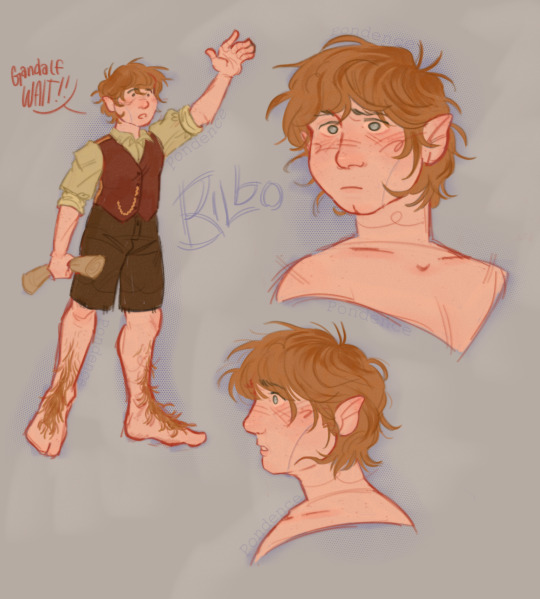Text
My favorite Tolkien illustration. I love being able to see Bilbo there.
Very clear image which is excellent to enjoy. We can even see Bilbo's pointy ears.
Tolkien is an incredible illustrator❤️

Bilbo woke up with the early sun in his eyes by J.R.R. Tolkien
83 notes
·
View notes
Text
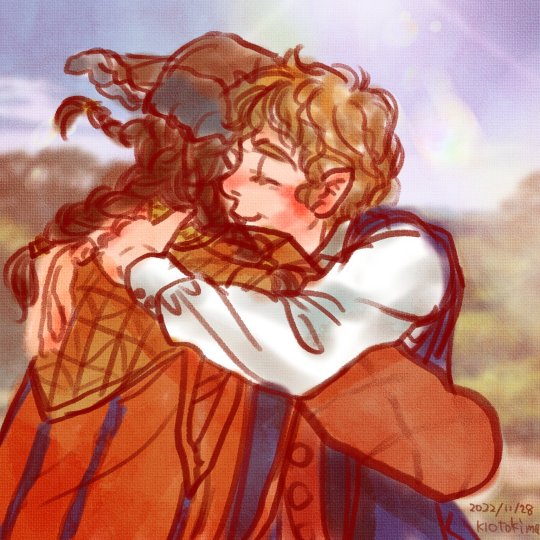
It's been a long time since I drew these lovely people.
Bilbo and Bofur
2022/11/28
103 notes
·
View notes
Text
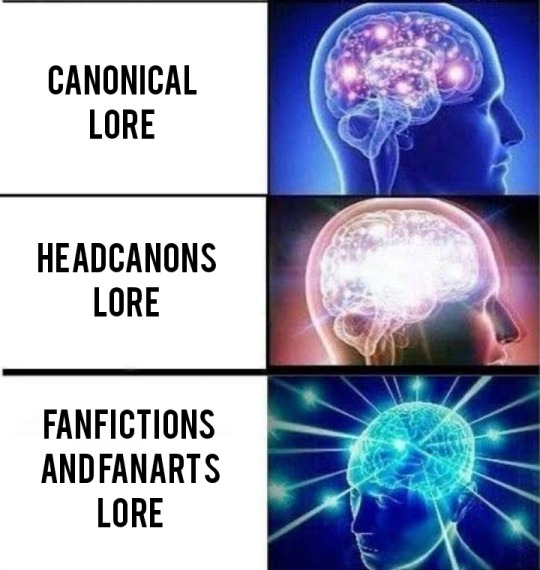
Not wanting to delegitimize the work of the original authors, after all 'll always be grateful to them for giving me incredible stories and characters. But I confess that simply love the vastness of multiple ideas, diversity and different ways of thinking (and rethinking) and draw (and redesign) that Headcanons, FanFictions e Fanarts offer to me.
#fandom#fanfictions#ao3#fanart#headcanon#Nothing can surpass the emotions feelings creativity hard work time and dedication that you put into your FanFiction/Fanart#and all this without demanding anything in return mostly#I already say I love you?#anti ai#because ai doesn't put the same amount of HEART into what it's doing#And for each FanFiction and Fanart there is an author/ficwriter and artist with a personal story of why wrote/drawn that thing#with some vibrations in a stage and year of life#the hobbit#sherlock holmes#Tag a fandom that you like to read FanFictions and see Fanarts
4 notes
·
View notes
Text
Friendship...
I just love the friendship between Bilbo and Elrond, Bilbo and Aragorn, Bilbo and Frodo, and Bilbo and Thranduil, and I'm sad because I've already read all the little fanfictions about Bilbo's friendship with them!
So here are some excerpts from the books in case anyone wants to get inspired:
“Hmmm! it smells like elves!” thought Bilbo, and he looked up at the stars. … He loved elves, though he seldom met them. … Bilbo would have liked to stay a while. Also he would have liked to have a few private words with these people that seemed to know his names and all about him, although he had never seen them before. He thought their opinion of his adventure might be interesting. Elves know a lot and are wondrous folk for news, and know what is going on among the peoples of the land, as quick as water flows, or quicker. (…) They (the dwarves, Gandalf and Bilbo) stayed long in that good house, fourteen days at least, and they found it hard to leave. Bilbo would gladly have stopped therefor ever and ever.
The master of the house was an elf-friend — one of those people whose fathers came into the strange stories before the beginning of History, the wars of the evil goblins and the elves and the first men in the North. In those days of our tale there were still some people who had both elves and heroes of the North for ancestors, and Elrond the master of the house was their chief. — He was as noble and as fair in face as an elf-lord, as strong as a warrior, as wise as a wizard, as venerable as a king of dwarves, and as kind as summer. He comes into many tales, but his part in the story of Bilbo’s great adventure is only a small one, though important (…) His house was perfect, whether you liked food, or sleep, or work, or story-telling, or singing, or just sitting and thinking best, or a pleasant mixture of them all. Evil things did not come into that valley.
(...) Bilbo heard many stories there (...)
“What are moon-letters?” asked the hobbit full of excitement. He loved maps (…) and he also liked runes and letters and cunning handwriting, though when he wrote himself it was a bit thin and spidery.
“Moon-letters are rune-letters, but you cannot see them,” said Elrond, “not when you look straight at them (…)”.
There a warm welcome was made them, and there were many eager ears that evening to hear the tale of their adventures (…). When the tale of their journeyings was told, there were other tales, and yet more tales, tales of long ago, and tales of new things, and tales of no time at all, till Bilbo’s head fell forward on his chest, and he snored comfortably in a corner. He woke to find himself in a white bed, and the moon shining through an open window. (…) “A little sleep does a great cure in the house of Elrond,” said he.
Weariness fell from him soon in that house, and he had many a merry jest and dance, early and late, with the elves of the valley. - The Hobbit
‘(…) you are the heir of Bilbo, the Ring-finder.'
`Dear Bilbo!' said Frodo sleepily. `I wonder where he is. I wish he was here and could hear all about it. It would have made him laugh. (…)
Gloin looked at Frodo and smiled. 'You were very fond of Bilbo were you not?' he asked.
`Yes,' answered Frodo. 'I would rather see him than all the towers and palaces in the world.'
Elrond went forward and stood beside the silent figure. 'Awake little master!’ he said, with a smile. Then, turning to Frodo, he beckoned to him. 'Now at last the hour has come that you have wished for, Frodo,' he said. `Here is a friend that you have long missed.'
The dark figure raised its head and uncovered its face. `Bilbo!' cried Frodo with sudden recognition, and he sprang forward.
`Hello, Frodo my lad!' said Bilbo. `So you have got here at last. Ihoped you would manage it. Well, well! So all this feasting is in your honour, I hear. I hope you enjoyed yourself?'
`What were you doing?'
`Why, sitting and thinking. I do a lot of that nowadays, and this is the best place to do it in, as a rule. Wake up, indeed!' he said, cocking an eye at Elrond. There was a bright twinkle in it and no sign of sleepiness that Frodo could see. 'Wake up! I was not asleep. Master Elrond. If you want to know, you have all come out from your feast too soon, and you have disturbed me-in the middle of making up a song. (…) I shall have to get my friend the Dunadan to help me. Where is he?'
Elrond laughed. `He shall be found,' he said. (...)
They did not notice the arrival of a man clad in dark green cloth. For many minutes he stood looking down at them with a smile. Suddenly Bilbo looked up. 'Ah, there you are at last, Dunadan!' he cried.
`Strider!' said Frodo. `You seem to have a lot of names.' (…)
`Where have you been, my friend? Why weren't you at the feast? The Lady Arwen was there.'
Strider looked down at Bilbo gravely. `I know,' he said. 'But often I must put mirth aside. Elladan and Elrohir have returned out of the Wild (…).
`Well, my dear fellow,' said Bilbo, `now you've heard the news, can't you spare me a moment? I want your help in something urgent. Elrond says this song of mine is to be finished before the end of the evening, and I am stuck. Let's go off into a corner and polish it up!'
Strider smiled. `Come then!' he said. `Let me hear it!'
(…)
`I was not sent to beg any boon, but to seek only the meaning of a riddle,' answered Boromir proudly(…) He looked again at Aragorn, and doubt was in his eyes.
Frodo felt Bilbo stir impatiently at his side. Evidently he was annoyed on his friend's behalf. Standing suddenly up he burst out:
‘(…) Not all those who wander are lost (…)’. Not very good perhaps, but to the point -- if you need more beyond the word of Elrond. If that was worth a journey of a hundred and ten days to hear, you had best listen to it.' He sat down with a snort.
`I made that up myself,' he whispered to Frodo, `for the Dunadan, a long time ago when he first told me about himself. I almost wish that my adventures were not over, and that I could go with him when his day comes.'
Aragorn smiled at him; then he turned to Boromir again. `For my part I forgive your doubt,' he said.
- The Lord Of The Rings.
And for Bilbo and Thranduil, here, see this post:
#the hobbit#bilbo baggins#lord of the rings#lotr#elrond#elrond peredhel#frodo baggins#aragorn#thranduil#tolkien books#jrr tolkien#I need more fanfictions
21 notes
·
View notes
Photo
OMG, so cute❤️❤️❤️
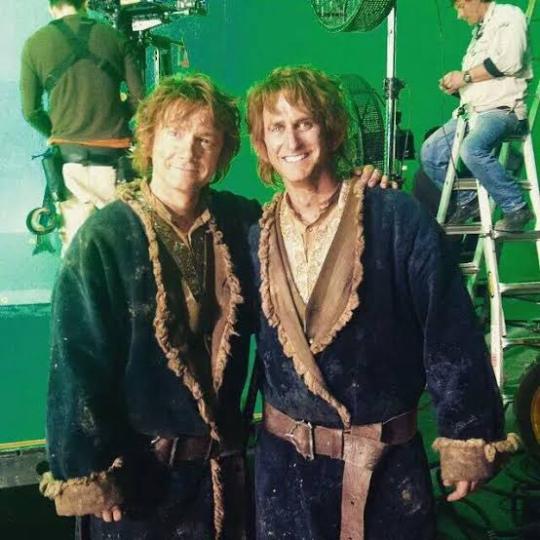
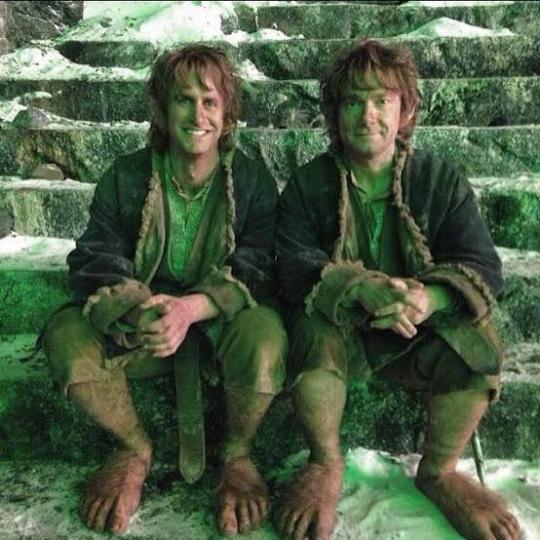

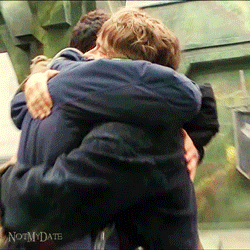
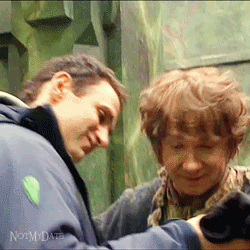
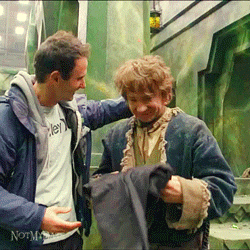

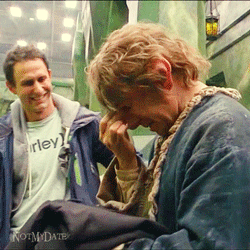
Martin Freeman receives a farewell gift from his stunt double/safety guy, Brett Sheerin, and becomes unexpectedly emotional. Brett had a very important job keeping our hobbit safe.
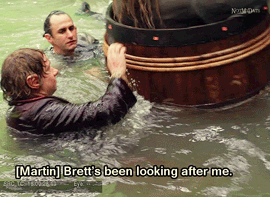
3K notes
·
View notes
Photo
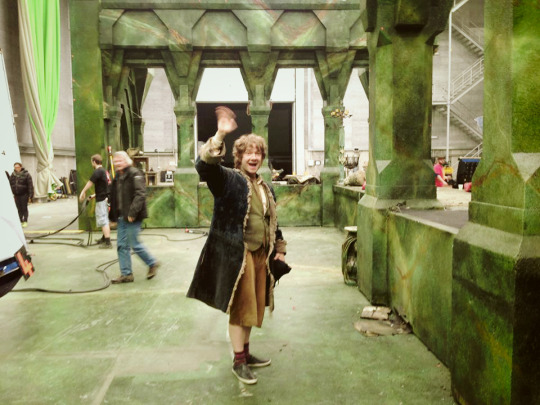
“Tonight Martin Freeman finished his last shot as Bilbo Baggins. The end of an incredible two and a half years. I cannot imagine anyone else in this role - a character that Martin has nurtured and crafted with love and great skill.”
Peter Jackson on Martin Freeman’s last day on The Hobbit
321 notes
·
View notes
Photo

#The Hobbit#Martin Freeman#the hobbit movies#the hobbit trilogy#oh it's been so long#but it's still good to be able to see posts like this#bilbo baggins
551 notes
·
View notes
Text
Me: I don't have a favorite character, I love them all equally.
My home wall:

#the hobbit#bilbo baggins#martin freeman#bilbo my beloved#the hobbit trilogy#the hobbit movies#the hobbit memes#funny memes#bilbo is my favorite character#i love bilbo
38 notes
·
View notes
Text
This looks amazing, so technically we're the ones who should thank you for sharing your art with us ❤️
I loved it, Bilbo is my favorite character (from the Third Age of this world😅) and I like Freeman's interpretation in The Hobbit movies; you drew him wonderfully❤️
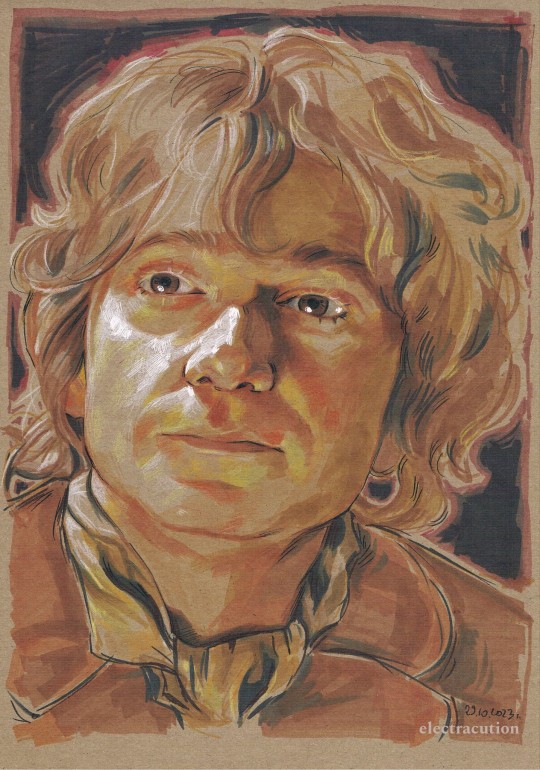
I was telling myself I wasn't going to be posting my art anywhere ever again, but you all are so sweet I have to. It will not, however, be just my art. I'll post about my writing too. And all other shit that happens in my head :)) enjoy ;))
1K notes
·
View notes
Text
My friends and I were debating who was most important in destroying the One Ring...
Gandalf, who liked the Hobbits very much and trusted them and urged the Hobbits (first Bilbo/ after Frodo and Sam) to go on their respective journeys. Bilbo, who found the One Ring and later spared Gollum's life, as well as adopted Frodo, leaving the One Ring to him. Frodo, who volunteered to destroy the One Ring when he knew they needed to do so, and was the only one who trusted Gollum to take him to Mordor. Sam, who accompanied Frodo and was by his side in his darkest hours and carried Frodo and the One Ring to Orodruin/Mount Doom. Or Gollum who, even if it was not his real intention, was the one who actually led to the destruction of the One Ring by disputing possession of the object with Frodo, resulting in his own death and destruction of the item.
In the end, after much deliberation, we came to the consensus that this was like a Relay race; where not only the one who crosses the finish line with the 'baton/stick-like', in this case the One Ring, is responsible for the victory, but rather that everyone involved was necessary. If any of them no performing their actions, the victory would not have been possible.
We all found the conclusion satisfactory, regardless of which character we are most fans of.
BUT let's remember Gandalf's phrase:
"You don't really suppose, do you, that all your adventures and escapes were managed by mere luck, just for your sole benefit. You are only quite a little fellow in a wide world".
There was more than luck guiding each of them, and it wasn't 'plot armor' but rather 'divine providence'. In the end, all things worked together for good, this providence which does not choose the skilled but enables the chosen. And no matter how hard Sauron tried to undermine his enemies, the good proved more ingenious in the way that wove destiny and led the evil to downfall.
In the end, none of these characters we love is the true hero, it turns out that Tolkien is very subtle about pointing out his Catholic inclination in the plot. But it is there.
#the hobbit#bilbo baggins#frodo baggins#gandalf#samwise gamgee#gollum#smeagol#the one ring#Tolkien#lord of the rings#lotr#jrr tolkien#tolkien books
31 notes
·
View notes
Text
After reading this I got curious and picked up my book The Hobbit and, even here, Tolkien already makes this division. Elrond is not a 'Elf' (someone had already mentioned this to me, but only after seeing this post I check).
The master of the house was an elf-friend - one of those people whose fathers came into the strange stories before the beginning of History, the wars of the evil goblins and the elves and the first men in the North. In those days of our tale there were still some people who had both elves and heroes of the North for ancestors, and Elrond, the master of the house, was their chief.
He was as noble and as fair in face as an elf-lord, as strong as a warrior, as wise as a wizard, as venerable as a king of dwarves, and as kind as summer. He comes into many tales, but his part in the story of Bilbo’s great adventure is only a small one, though important (…) His house was perfect, whether you liked food, or sleep, or work, or story-telling, or singing, or just sitting and thinking best, or a pleasant mixture of them all. Evil things did not come into that valley.
The Hobbit, chapter III, A Short Rest.
I'm rereading lotr now and almost done with fellowship, and it's really interesting how Elrond is never ONCE, ever, referred to as an elf (but rather, as a half-elf, Halfelven). not even when boromir is ranting unwelly:
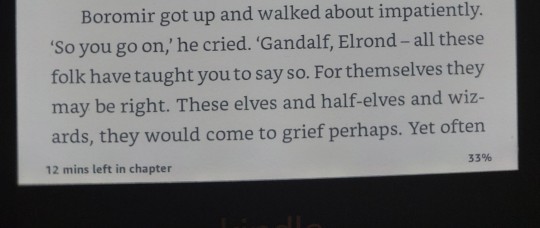
#the hobbit#bilbo baggins#lotr#lord of the rings#elrond#tolkien#jrr tolkien#i love bilbo#and Bilbo made me love Elrond
2K notes
·
View notes
Text
Sherlock Holmes: I'm looking for someone to share 221B Baker Street.
John H. Watson: I consider myself qualified to fill this gap.
Sherlock Holmes: I'm also looking for someone loyal and trustworthy, who doesn't ask stupid things, does what I say, ignores my experiments and chemicals around the apartment, doesn't mind customers showing up at any time of the day or midnight, someone helpful and who accompanies me in investigations, participates with me in police and criminal investigations even if it bring subsequent risks, praises me until I blush, doesn't try to steal the spotlight for themselves and, instead, makes me the protagonist of a investigative detective story that lasts for years and years, who understands my ego, is tolerant with my drug use, is not spiteful and forgives me whenever I'm overly practical seeming like an reasoning-machine without emotionless, someone who does not feel personally attacked every time I leave you out of my plans and understand my silence and preference for not being a sociable person, and someone that only tell stories about me when I want to disclose and give permission for it, someone who knows how to list more positives things than negatives about me naturally, be a true friend and partner in easy and difficult times, and stays by my side regardless of the circumstances and holds me in the highest esteem, proving our productive and irreverent union as a dynamic duo.
John H. Watson: Hey, that's a lot of requirements. But consider myself capable. I want to try. Where do I sign? Can I test this for a month?
Sherlock Holmes: my dear, if you stay for a month, it's a sign that you'll be addicted to my queerly peculiar and unique presence for the rest of your life. If gets for a month, you might even try to leave me, but you'll come back. You'll come back.
John H. Watson: Interesting. Where do I sign?
Sherlock Holmes: you already love my presence, you are already fascinated.
John H. Watson: Is it obvious?
Sherlock Holmes: don't break the clauses, my dear, no stupid questions. You haven't broken eye contact with me since we started this conversation, you've been smiling since the beginning, you've looked at my appearance and haven't been shaken by what I said, you lean towards me as I speak, showing interest, you mirror my movements. More important, you seems nervous and wants to please me. And add, you likes read mysteries romances. And have a callus on your right little finger, you like to write down your experiences and you do it often, if you are going to live with me, you 'll write about our adventures because you 'll be part of them. On the other hand, you went to war and suffered injuries, but you don't complain about the service provided, this shows altruism and subservience, and you chose medicine, not for money but because you care about others more than yourself, it is a profession which demands care for the lives of others. And you are too empathetic towards others. So it's clear that you wouldn't mind putting me first, you 're humble. More, is eager for adrenaline and is particularly curious about what I can offer to you.
John H. Watson: Bless my, this is fantastic, you are incredible, brilliant.
Sherlock Holmes: That's promising.
John H. Watson: Couldn't agree more, bless Stamford.
#sherlock holmes#johnlock#sherlock holmes/john watson#holmes/watson#Incorrect But correct quotes#acd johnlock#acd canon
84 notes
·
View notes
Text
One of the things that’s really struck me while rereading the Lord of the Rings–knowing much more about Tolkien than I did the last time I read it–is how individual a story it is.
We tend to think of it as a genre story now, I think–because it’s so good, and so unprecedented, that Tolkien accidentally inspired a whole new fantasy culture, which is kind of hilarious. Wanting to “write like Tolkien,” I think, is generally seen as “writing an Epic Fantasy Universe with invented races and geography and history and languages, world-saving quests and dragons and kings.” But… But…
Here’s the thing. I don’t think those elements are at all what make The Hobbit and The Lord of the Rings so good. Because I’m realizing, as I did not realize when I was a kid, that Tolkien didn’t use those elements because they’re somehow inherently better than other things. He used them purely because they were what he liked and what he knew.
The Shire exists because he was an Englishman who partially grew up in, and loved, the British countryside, and Hobbits are born out of his very English, very traditionalist values. Tom Bombadil was one of his kids’ toys that he had already invented stories about and then incorporated into Middle-Earth. He wrote about elves and dwarves because he knew elves and dwarves from the old literature/mythology that he’d made his career. The Rohirrim are an expression of the ancient cultures he studied. There are a half-dozen invented languages in Middle-Earth because he was a linguist. The themes of war and loss and corruption were important to him, and were things he knew intimately, because of the point in history during which he lived; and all the morality of the stories, the grace and humility and hope-in-despair, was an expression of his Catholic faith.
J. R. R. Tolkien created an incredible, beautiful, unparalleled world not specifically by writing about elves and dwarves and linguistics, but by embracing all of his strengths and loves and all the things he best understood, and writing about them with all of his skill and talent. The fact that those things happened to be elves and dwarves and linguistics is what makes Middle-Earth Middle-Earth; but it is not what makes Middle-Earth good.
What makes it good is that every element that went into it was an element J. R. R. Tolkien knew and loved and understood. He brought it out of his scholarship and hobbies and life experience and ideals, and he wrote the story no one else could have written… And did it so well that other people have been trying to write it ever since.
So… I think, if we really want to write like Tolkien (as I do), we shouldn’t specifically be trying to write like linguists, or historical experts, or veterans, or or or… We should try to write like people who’ve gathered all their favorite and most important things together, and are playing with the stuff those things are made of just for the joy of it. We need to write like ourselves.
17K notes
·
View notes
Text
Frodo may be Bilbo’s actual adopted nephew, but Merry and Pippin are his younger cousins, and Sam is his old gardener’s son whose family he clearly has a soft spot for and who he taught to read and write, and Gimli is the son of one of his old adventuring friends, and Legolas is, similarly, the son of the Elvenking who named him an elf-friend, and we know Aragorn is canonically his friend as well, who he very possibly could have met as a small child in Rivendell when he passed through, so really, like 7/9 members of the Fellowship are people he can employ weird elderly relative (or the honorary equivalent thereof) energy on if he wants to and I think that’s very powerful.
76K notes
·
View notes
Text
Yes, I totally agree with all of this.
I also did my analysis of the character on AO3, because, well, 's Bilbo! Who don't love him?
Bilbo's Personality

Oh, man. I sat on this question for a long time, but even after lots of thought I feel that it’s just way to broad a topic to write a “real” post about. So, what I’m doing instead is just listed a few main points to pay attention to when it comes to Bilbo’s personality/character.
Incorruptible: Bilbo’s most important quality, I think, is the fact that he’s pretty much incorruptible - at the very least, he’s more incorruptible than his companions. We see several events during the story when the dwarves’ behavior changes because they’re feeling greedy, or proud, or vengeful. Bilbo doesn’t have this same problem. He isn’t particularly impressed by any of the treasure they find during the journey, he completely doesn’t understand the point of the Battle of Five Armies, and even after all that he goes through, and all that he learns about himself and his own abilities, all Bilbo wants to do in the end is go home to his hobbit-hole. Of course, this incorruptible nature is something that’s expanded on a great deal in LOTR, as Tolkien basically makes that a common hobbit trait, and a huge factor in Frodo’s quest to destroy the One Ring.
Brave and Clever: For all that Bilbo is basically a stuffy homebody when the story starts, he does a lot of really brave and heroic things during the story, and proves several times how clever he is. He handles the entire troll situation a lot better than most people would, he navigates the encounter with Gollum carefully, and he stays alive a lot longer than most of the dwarves expected, I think. He saves everyone from the giant spiders (which is really quite impressive, when you think about it), he basically holds a battle of wits with Smaug, which is really impressive. And when all the armies arrive, Bilbo is brave and wise and honorable enough to risk losing his friendship with Thorin and the dwarves in an attempt to avoid what he recognizes is pointless violence. Not bad for a simple hobbit.
The Baggins vs. Took Conflict: A lot of Bilbo’s personality comes through in the “Baggins vs. Took” conflict that Tolkien brings up many times during the story. Bilbo constantly feels that the influence of both of his families play out like a tug-of-war for his behavior. Sometimes he feels a lot like a Baggins, and doesn’t want to do anything weird, and gets upset about missing breakfast, and misses his bed and his armchair and hates Gandalf and the dwarves for making his life complicated. But then other times he feels a lot like a Took, and is excited to be on an adventure and wants to see new places, and meet elves and big folk, and do amazing things, and he’s actually pretty happy that he met Gandalf and the dwarves. And he switches back and forth between these two sides throughout the story. I don’t think that any one family “won”, but I do think that, by the end of the story, Bilbo is comfortable with both sides of himself, and doesn’t feel quite so much anxiety over the conflict.
Sorry again for the long wait - hope this post kind of makes up for it. :)
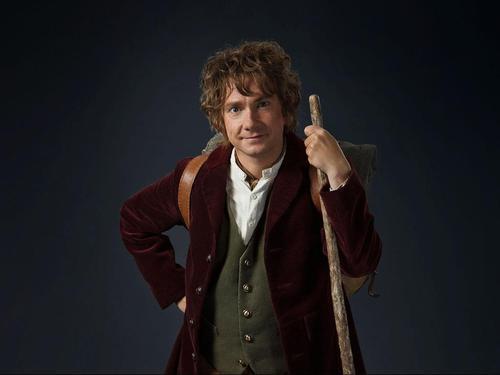
SOURCES: The Hobbit
#the hobbit#bilbo baggins#lord of the rings#bilbo my beloved#an analysis of bilbo baggins#the hobbit book#the hobbit movies
106 notes
·
View notes
Text
Peter Jackson Remembers Sir Ian Holm
The Wonderful Sir Ian Holm
I’m feeling very sad at the passing of Sir Ian Holm.
Ian was such a delightful, generous man. Quiet, but cheeky, with a lovely twinkle in his eye.
Back in early 2000, before we started shooting our Bilbo scenes for The Fellowship of the Ring, I was nervous about working with such an esteemed actor, but he immediately put me at ease. Standing in Bag End on the first day, before cameras started rolling, he took me to one side and said that he would be trying different things in every take, but I shouldn’t be alarmed. If, after five or six takes, he hadn’t given me what I needed, then by all means I should give him specific direction.
And that’s exactly what we did. But incredibly his varied line reads and performances were all quite wonderful. He rarely needed direction. He gave us an amazing range of choices to select from in the cutting room.
We settled into a very enjoyable four weeks, as we shot the first 30 minutes of Fellowship.
One day we had Bilbo delivering an account of his early adventures to an audience of spellbound three and four year olds, who are sitting cross legged at his feet in the party field. We started by filming Ian’s performance telling the story - but we also needed angles on the children reacting to various dramatic moments. But young kids get bored very quickly, and Ian and I quickly realised that they couldn’t hear the same story over and over again, as we captured the various angles we needed.
I suggested that to keep the kids’ attention, he should make the story a little different in each take … adding extras bits, making stuff up … so long as he gave us the essence of what was in the script. I told him not to worry and that I’d figure it out in the cutting room.
However, we also needed the kids to stay in place while we quickly moved the cameras around, from one angle to another. On a film set, “quickly” means 15 - 20 minutes. So, while this was happening, and no cameras were rolling, I whispered to Ian that he was going to have to keep them entertained. I helpfully suggested that he could, “tell them other stories between shots”. And that’s exactly what he did. After a couple of hours, we shot everything we needed.
As the kids were ushered off set, and the crew moved onto the next sequence, Ian said that he’d never worked so hard in his life!
Over a decade later, we hoped that Ian would play Bilbo again for the opening scenes of The Hobbit. Fran and I had dinner with Ian and his wife Sophie in London, and he told us that he was very sorry, but he couldn’t do it. Adding to our shock, he confided that he’d been diagnosed with Parkinson’s disease, and could no longer remember lines. He had difficulty walking, and certainly couldn’t travel to New Zealand. Always a private man, he told us that he’d basically retired, but wasn’t announcing it.
This was a blow because we had worked out a nice way to hand the role over from Ian as Old Bilbo, to Martin Freeman as Young Bilbo. I described this to him, and he liked it. I also told him how my mother and an uncle had both endured Parkinson’s for years, and I was very familiar with the effects of the disease.
At this point, our dinner - which we thought would be about us describing the new scenes we’d like him to do, and Ian thought would be about him explaining why he couldn’t do it - suddenly turned into a think tank, with Ian, Sophie, Fran and I trying to figure out a process that would allow Ian to play Bilbo one last time.
We’re shooting the movies in New Zealand - but what say we came to London and shoot his scenes close to home? By the end of the dinner he nodded slowly, and said, “Yes, I think I could do that”. But I knew he was only doing it as a favour to me, and I held his hands and thanked him with tears in my eyes.We started shooting in New Zealand with Martin Freeman, as our Young Bilbo. Martin hugely admired Ian Holm but had never met him. However, Martin very generously agreed to wear prosthetic make-up to play Sir Ian Holm playing Old Bilbo, for some NZ based wide shots that we needed, and he captured his mannerisms very well.
A couple of months later we returned to London, taking our Bag End set with us, and filmed Ian’s shots with a tiny crew as we promised. Ian’s lovely wife Sophie was at his side every day, helping both him and us.
Over the course of four days we filmed everything we needed. Elijah Wood and Ian had become friends back on Lord of the Rings, and Elijah was on set in London every day, giving Ian additional support.In the finished movie, I hope that audiences just see Ian Holm reprising Bilbo. But what I experienced on set was a wonderful actor delivering his last performance. It was incredibly brave of him to do that, and very emotional for those who witnessed it.
We will always be enormously grateful to Ian for doing that. During our time together, Fran and I became so fond of him, and we enjoyed his company very much.
To celebrate the completion of filming, Ian and Sophie invited Fran and I to dinner at their house. That was a lovely night, full of humour and fun. Ian and I realised we both had a strong mutual interest in Napoleon and chatted about him for hours.
A year later, when the first Hobbit movie premiered in London, a slightly star-struck Martin Freeman finally got to meet Ian Holm.
Watching Ian Holm perform taught me so much - as Ian was being his usual quiet self, that just somehow happened. It was a privilege to work with him, and a blessing to know him.
I’ve always loved Ian’s performance in the final scenes of Return of the King.
“I think I’m quite ready for another adventure.”
Farewell, dear Bilbo. Safe travels, darling Ian.
Peter Jackson
#The Hobbit#Lord of the Rings#Ian Holm#Peter Jackson#the hobbit movies#the hobbit trilogy#Old Bilbo#bilbo my beloved#RIP Ian Holm
1K notes
·
View notes
